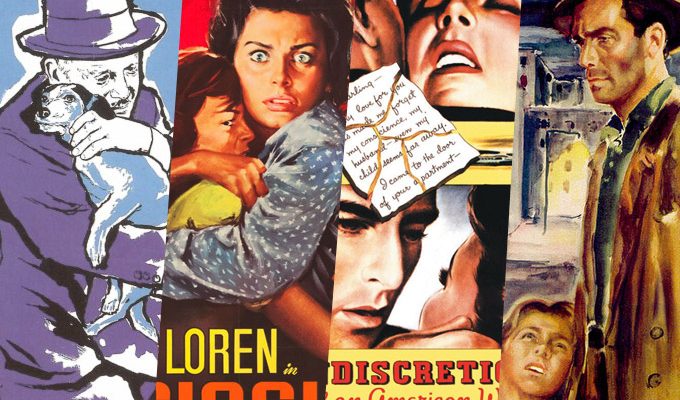 “Yesterday, Today and Tomorrow” (1963)
“Yesterday, Today and Tomorrow” (1963)
Though this anthology — with Italian icons Sophia Loren and Marcello Mastroianni featured in all of them — is De Sica in his later crowd-pleasing mode, his old neo-realist obsessions can be glimpsed throughout. In the first episode, the working-class community that protected the young bicycle thief in “Bicycle Thieves” is transmuted into a working-class community protecting Adelina (Loren), who initially gets around going to jail for stealing by giving birth to a slew of kids, thus exploiting a legal loophole to a ruthlessly absurd degree. Class division is the focus of the second episode: a romantic drive with aristocrat Anna (Loren) and artist Renzo (Mastroianni), the former expressing boredom with her lifestyle — until Renzo accidentally crashes her Rolls-Royce whereupon she only expresses concern for the vehicle. And the clash between the worldly and the spiritual underpins the final episode, as prostitute Mara (Loren) at first tries to seduce young priest Umberto (Gianni Ridolfi) until, upon his grandmother’s tearful pleas, she not only tries to convince Umberto to return to the priesthood, but vows to swear off sex for a week, to the dismay of current paramour Augusto (Mastroianni). The three segments range from intriguing (the third episode) to insufferable (the first), and the whole falls some way short of classic status, but Loren and Mastroianni bring their characters to life with all their not-inconsiderable star power.
 “Marriage Italian Style” (1964)
“Marriage Italian Style” (1964)
Sophia Loren plays another prostitute in this, her fourth collaboration with co-star Marcello Mastroianni and director Vittorio De Sica… but instead of the randy comedy of the third segment of “Yesterday, Today and Tomorrow,” “Marriage Italian Style” is something of a sweeping romantic saga. Spanning 22 years in the on-and-off relationship between Filumena Marturano (Loren) and callous businessman Domenico (Mastroianni), it is basically the story of him using her at his convenience until she decides to take a stand for the financial security of not only herself but the three children she bore over the years. The film’s narrative structure provides some passing formal interest, especially during Domenico’s extended flashback, in which De Sica jumps through time in a boldly elliptical manner, without any title cards to indicate how much time has passed between scenes. Mostly, though, “Marriage Italian Style” offers a showcase for Loren’s brassily comic and poignantly dramatic sides; for once, Mastroianni’s mustachioed cad is hardly a match for Loren’s life-force energy, even at her character’s most worn-out.
 “The Garden of the Finzi-Continis” (1970)
“The Garden of the Finzi-Continis” (1970)
After a run of strident comedies and soapy romances De Sica, nearly as old as the century, seemed unlikely to produce another masterpiece. And yet along came this Oscar-winning adaptation of Giorgio Bassani‘s famous novel, to prove that there was life, insight and profound emotional depth to be found in De Sica’s filmmaking yet. A deceptively clever film ostensibly dealing in the romances and class conflicts within a group of well-off Jews in pre-war Italy, ‘Garden‘ reveals itself in its final act as an allegory of the most distressing kind. Middle-class Giorgio (Lino Cappolicchio) has loved Micol Finzi-Contini (Dominique Sanda) since childhood, but self-centered child of privilege Micol rebuffs him. Instead she, along with her sickly brother Alberto (Helmut Berger), favors the company of communist firebrand Malnate (Fabio Testi), as the encroaching tide of anti-Semitism leads the whole family to sequester themselves in the prelapsarian idyll of their home — a quiet place full of culture, sunshine and tennis parties. A moving caution against the “if it doesn’t affect us directly, say nothing” school of thought, ‘Garden’ is also an ache for loss, not so much of life as for the beauty, drama and intrigue that every single one of those lives contained.
If there are other De Sica titles you feel we’ve unfairly excluded, let us know about them in the comments. Meanwhile the (terrific) Film Forum season runs through October 8th.
–Jessica Kiang, Rodrigo Perez, Kenji Fujishima

